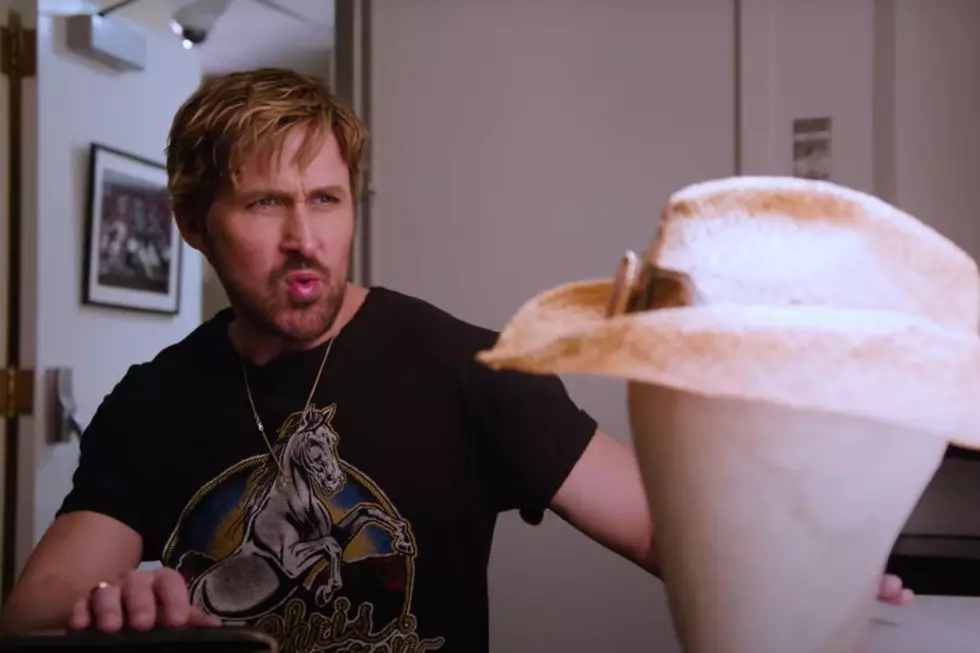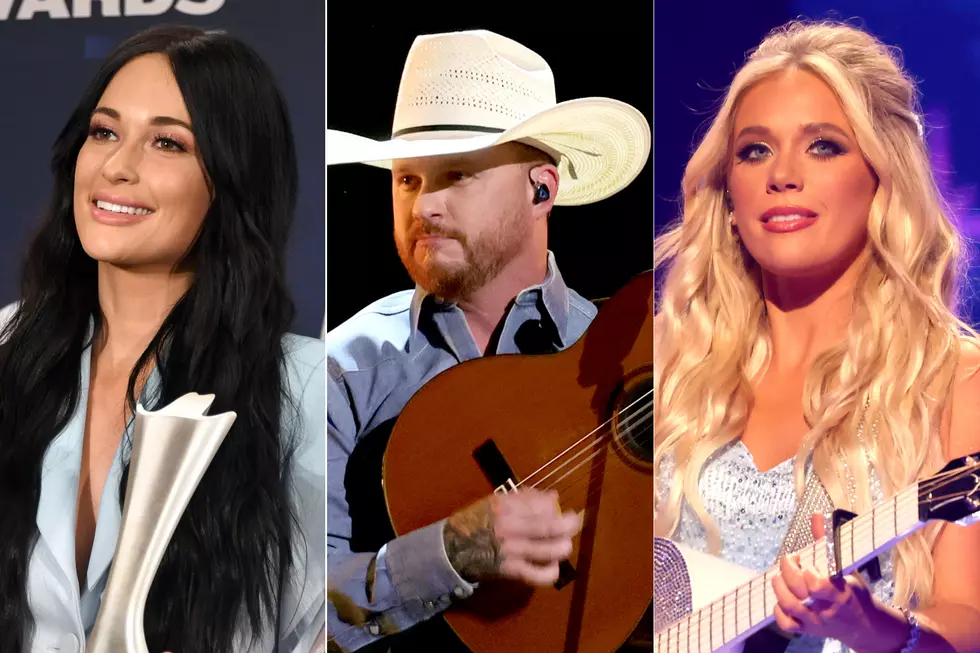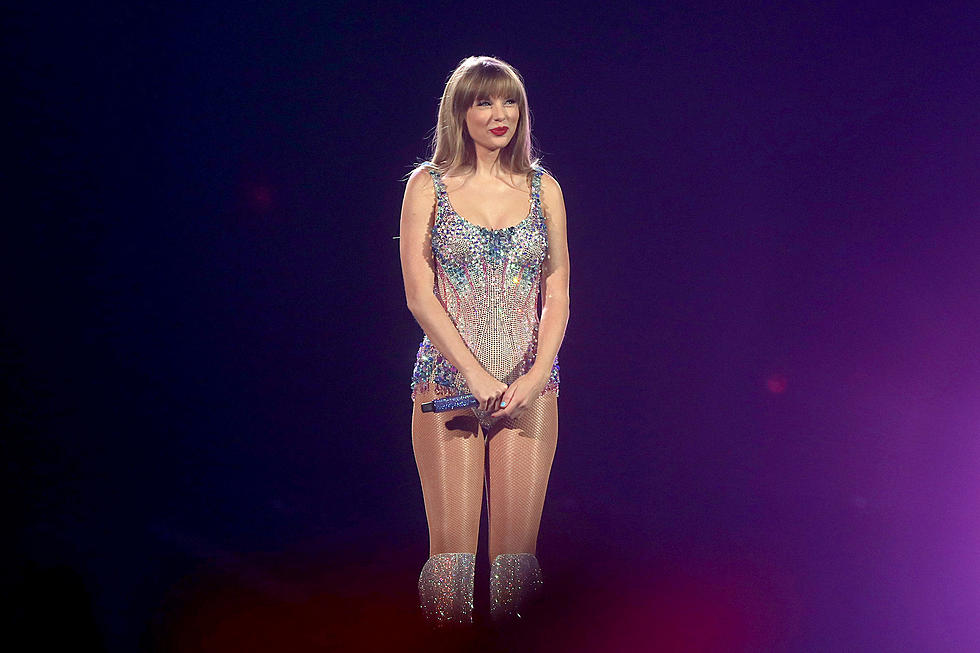
Chris Stapleton Discusses His Acclaimed Solo Debut, ‘Traveller’
Chris Stapleton has just released his debut solo album, but he's already one of the most well-respected singer-songwriters in contemporary country music.
Stapleton first came to public attention as the frontman for the SteelDrivers, scoring three Grammy nominations from his work with the group. He has also written a long string of songs for other artists as diverse as Adele, Tim McGraw, Brad Paisley and Dierks Bentley, and has hit No. 1 with songs he wrote for George Strait, Kenny Chesney and Darius Rucker. Most recently he co-wrote Luke Bryan's "Drink a Beer," which hit No. 1 and was nominated for Song of the Year at the 2015 ACM Awards.
Stapleton's unique songwriting and gritty vocal style are showcased on the newly-released solo album, Traveller, which is already shaping up to be one of the most critically acclaimed country albums of 2015. Media outlets including NPR, Rolling Stone and even the Wall Street Journal have praised the project, and Stapleton even got to perform its title song and first single on Late Night With David Letterman in the host's runup to his farewell episode.
Taste of Country caught up with Stapleton recently to discuss the long road to his debut album, his songwriting process, the rigors of touring and much more in the following wide-ranging interview.
Congratulations on your Letterman performance. He obviously went crazy for that.
I had a moment where I was at soundcheck, and I realized where I was standing — in the Ed Sullivan Theater. All that kind of stuff kind of hit me at once. Sometimes you run around and do things, and do as much as you can to try to matter, and then you get a moment like that where you really get to realize where you're at, and what you get to do. It was a big deal for me.
I was shocked that we even got to be on there in the last 30 shows or whatever that he was going to do. It was certainly something I'm proud of.
Do you get extra nervous before a thing like that? Do you have performing nerves in general?
No sir. Never. I will say rarely ever get nervous for anything. And I probably didn't know I was nervous at the time, doing that, because I try to approach everything I ever play like, 'Hey, I'm just gonna go play and have fun,' and do what I do. And if you do that, you can usually end up playing halfway decent. [Laughs]. But that was certainly one that we got about halfway through it, I definitely was feeling it. But it was cool. I really enjoyed doing it.
Your album, Traveller, has already got a huge amount of critical buzz around it in advance. That's got to be really gratifying.
Absolutely. You know, I have to thank Universal for just letting me make a project and put it out. It's kind of a strange thing in the way they normally do things and make records, but they really have been a wonderful partner and kinda looking to me for a vision of how we wanted to make this record and put it out, and thankfully, the critics have been kind as well, so that's a bonus.
These songs span the entirety of my 14-plus-year career as a songwriter.
What led to you having enough leverage to get a deal to make a record that's so strikingly different? A lot of the time a label might not be inclined to let a first-time solo artist do that.
I'm slightly different in that I have a lot of history with a lot of the folks that work there. The A&R guy that signed me to the label has been a friend for over a decade, and he kind of came to me with the notion of me making a record with them. You know, we've kinda gotten to this place; we're all adults, we talk to each other, like, 'Hey, I'd like to do this.' And they say, 'No, you can't do that,' or they say, 'Yeah, that'd be great.' And most of the time I get the go-ahead. I really have been super fortunate enough in that I respect them enough, and they respect me enough that they try to get something done that we both are happy with.
Tell us about the title song, "Traveller." Why did you choose it as the title song, and why did you want to make it the single?
Those things kinda happened organically. That was a song that I had written on a trip that I took after my dad passed away in 2013. My wife bought me an old Jeep, and we drove through the desert, and I wrote that song just thinking about life and how we're all just passing through it. I was driving down the road holding a phone, driving a '79 Cherokee, singing that into my phone.
It became a catalyst for a lot of the choices made on the record, and the more that we got into sequencing and all those kinds of things, the more it became something to tie them all together. And titling the record Traveller, it means different things. It seemed like the right thing to do, and so we did it.
Are all of the songs on the record written specifically for this record, or did you reach out to songs you've written in the past and just cull the best songs?
These songs span the entirety of my 14-plus-year career as a songwriter. Some of these songs are 12 or 13 years old, for sure. They are a cross section of that period of time, and I guess Traveller becomes an appropriate title for them in that way.
My wife was really helpful. She helped me sort through hundreds and hundreds of songs, and said, 'Hey, maybe you should think about these.' There was a lot of material to sift through, and some of the songs that have been around a while, I think that was indication enough that maybe they should be recorded — that they've hung around and become parts of shows that I play and things that people ask me to play. Some of these songs already have a life of their own outside of this record, so I just felt like I should include them.
With songs written over such a long period of time, what ties them all together, and what was the sort of narrative thread or theme that you were trying to go for?
I don't know at the outset if I was set on a theme. Like I said, I had lost my dad back in October 2013, and that really set me off ... it flipped a switch, maybe, thinking about things that he would have liked, and things that I listened to when I was a kid. Outlaw country and old R&B. That was certainly maybe a starting point for a lot of things, but ultimately I was just trying to pick the best songs that I felt like I wanted to sing. That was really the only criteria. Things that were as good of a song as I had to offer, and things that I enjoyed singing. Beyond that, hopefully the thread is the singing and playing, delivering performances that hopefully are believable.
Some of these songs already have a life of their own outside of this record, so I just felt like I should include them.
You recorded this at RCA Studio A.
That's correct. The bulk of the record was done there. We had one day that they had something else booked, so we moved to a studio called the Castle for a day. But the bulk of it was RCA Studio A.
Was this prior to all the threats of closing it down?
It was actually right in the middle of all that. Not just closing it down, tearing it down. I mean, I saw the plans for the condos! [Laughs]. And at the time that we were recording this, we were fairly certain that we were going to be one of the last things ever recorded in there, and we were all sad about that. But that was part of the reason for using that as a place to record, is we really wanted to be a part of that history before it was gone.
When you record in a room that's had that many sessions go down, is there really something special about the vibe in there?
It's beyond special, really. There's something in the walls when you have that many wonderful records and moments and culturally significant things that have taken place in a room. You can't help but feed on that and be inspired by that and want to be a part of it. When you really get in that room and look around and stand in the spot where Dolly Parton recorded "I Will Always Love You," or Waylon Jennings recorded lots of things ... you look around the room and see some pictures of those things, or see the chart from the day that, I think "Jolene" and "I Will Always Love You" were recorded in the same day. They still have the charts from it.
Those kinds of things are floating around that place, and when you have those kind of things that are standards, you feel a responsibility to be as good as you can be.
We wanted to ask you about some of the other songs from the record. One of them goes back to what you were saying about your father and his influence over the record. It's called "Daddy Doesn't Pray Anymore." What was the thought process behind that song?
That's a song that I wrote long before my father passed away. I had gone home for some holiday or something to my parents' house. My dad was a very straight arrow, prayed-at-every-meal kind of guy. For whatever reason, whether he was tired or wasn't feeling well, he didn't say grace at this particular meal, which he had done at every meal [Laughs] that I'd ever eaten with him. And he said it at every meal after that, but this particular meal he didn't, and it struck me that daddy doesn't pray anymore.
I kinda turned that idea around in my head, and my then girlfriend, now wife, we were at her apartment, she was getting ready to do something, and I was waiting on her, and she said, 'Well, why don't you just write a song?' [Laughs]. So I wrote that song in about 10 minutes, waiting on her to get ready before we went somewhere. I think it was maybe 2005 that I wrote that song. That song's been around that long, but it got weight after my father passed away. It felt like time to record it.
The last song on the record is "The Devil Named Music." What got that idea in your head?
Most of that song is true. I was in a band called the SteelDrivers, and we just played hard in vans, hopping on airplanes, not knowing where you're at. Literally, we drove all night to Billings, Montana 'cause we had started in Wyoming ... we drove to Billings in an E Series van, maybe even a minivan. Whatever the rental was. We wound up in Billings at maybe four o'clock in the morning, we had about an hour to rest in the hotel before we had to go to the airport. Then we hop on a plane, change planes in Denver — which I literally don't remember — and then we wound up in Salt Lake City, Utah.
I always tell people, 'The music's free. I get paid to travel.'
I remember it just being the limit of what I thought I could humanly take, as far as being beat up by travel, and I was much younger then. [Laughs]. It certainly gave me a little bit of pause, as far as, 'Man, what am I doing out here?' [Laughs]. I think that's where the song started, and then it went from there.
You've got some touring coming up around this record. Can you ever get used to that kind of travel? Like you say, just getting beaten up by circumstance.
Thankfully, with proper routing you can mostly avoid that kind of stuff, but sometimes it's just unavoidable. You do have to do some things sometimes that seem like, 'Man, I'm gonna do this, and then that? That seems like a terrible idea.' [Laughs]. But you do it anyway, because one, you like to play shows, and two, sometimes everybody has to do things in life that they don't necessarily like to do. I always tell people, 'The music's free. I get paid to travel.'
What other songs from the record do you think could be possible singles?
I don't think that we've necessarily thought that far ahead. We'll work on the single that we have, and as things organically present themselves, if the timing seems right — and people have a way of helping you figure these things out, too. As we play these songs at shows, we'll get that kind of feedback, too, and it'll help us steer where we're going.
What else do you want to say about Traveller, or whatever else you've got going on?
We're just playing shows. I hope everybody that would like to give some good music a listen will give the album a listen, and come out and see us live. I'm proud of what we've done, and I hope people will give it a shot.
More Great Country Artists to Watch This Year
More From Taste of Country
![Chris Stapleton Victimized in Hilarious ‘SNL’ Skit: ‘Get That Boy Back’ [Watch]](http://townsquare.media/site/204/files/2024/04/attachment-stapleton-snl-skit.jpg?w=980&q=75)








